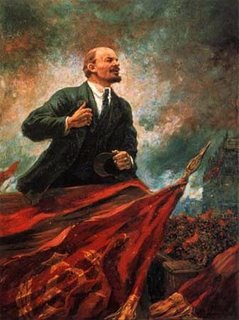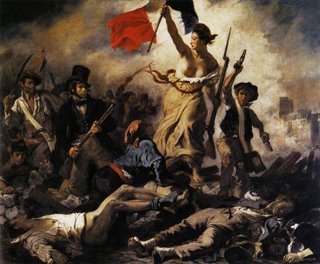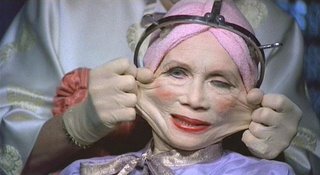Zizek's Politics!
 For the past few days I've been working my way through Jodi Dean's Zizek's Politics. Hegel often speaks of the dialectical operation of positing ones presuppositions, where everything is already there and it's simply a question of explicitly positing it so the next series of deadlocks might be thought. Thus, for instance, in the dialectical movement from being to becoming in the Science of Logic, becoming is already there in the relation between being and nothing, yet it has not yet been posited for itself. With the positing of becoming as the truth of the relation between being and nothing, it now becomes possible to posit Dasein (determinate being) as the truth of becoming, and so on. Something new is introduced as a result of this activity of positing that makes other things thinkable.
For the past few days I've been working my way through Jodi Dean's Zizek's Politics. Hegel often speaks of the dialectical operation of positing ones presuppositions, where everything is already there and it's simply a question of explicitly positing it so the next series of deadlocks might be thought. Thus, for instance, in the dialectical movement from being to becoming in the Science of Logic, becoming is already there in the relation between being and nothing, yet it has not yet been posited for itself. With the positing of becoming as the truth of the relation between being and nothing, it now becomes possible to posit Dasein (determinate being) as the truth of becoming, and so on. Something new is introduced as a result of this activity of positing that makes other things thinkable.In many respects, this is how Dean's study of Zizek reads. Dean does not simply gather together what Zizek has said on this or that particular issue or recap his theory of ideology. She doesn't simply gather together a set of key signifiers that populate Zizek's text, but rather articulates a problem at the heart of Zizek's thought and puts this problem to work. The result is that a thread is lifted from Zizek's numerous writings that can nowhere be directly found in these writings, but which is nonetheless present in all of these writings... This thread is the thread of revolution and the question of how change might be possible within the current economic and political universe within which we find ourselves. What are the seductive traps that need to be avoided and what opportunities do we find in our contemporary economic and ideological field?
The danger with Zizek is that one can easily come to be hypnotized by his endless ideological analyses of popular culture, com
 ing to see such ideology analysis as an end in itself. Like the leftist intellectual that talks endlessly about wanting to be involved in a meaningful political movement if only there were such alternatives (thus revealing her desire for everything to remain the same), it is possible for the critique of ideology to become an end in itself, directed not towards producing change, but rather directed towards maintaining things exactly as they are, while affording the intellectual the enjoyment of feeling superior to all of those suckered by the various ideological mechanisms about him. Indeed, this jouissance borne out of one's sense of superiority is itself a significant ideological mechanism, attaching us to contemporary forms of power. In this regard, Dean's discussion of Zizek in terms of his politics, rather than theory of ideology, is welcome and refreshing. The picture of Zizek we get is one that is significant far beyond the sometimes arcane, though always amusing, world of cultural studies and pop cultural analysis, formulating a picture of a concrete praxis at work in Zizek's thought. None of this is to suggest that Dean does not have a great deal to say about Zizek's theory of ideology, only that she puts it in its proper place in relation to a broader political project.
ing to see such ideology analysis as an end in itself. Like the leftist intellectual that talks endlessly about wanting to be involved in a meaningful political movement if only there were such alternatives (thus revealing her desire for everything to remain the same), it is possible for the critique of ideology to become an end in itself, directed not towards producing change, but rather directed towards maintaining things exactly as they are, while affording the intellectual the enjoyment of feeling superior to all of those suckered by the various ideological mechanisms about him. Indeed, this jouissance borne out of one's sense of superiority is itself a significant ideological mechanism, attaching us to contemporary forms of power. In this regard, Dean's discussion of Zizek in terms of his politics, rather than theory of ideology, is welcome and refreshing. The picture of Zizek we get is one that is significant far beyond the sometimes arcane, though always amusing, world of cultural studies and pop cultural analysis, formulating a picture of a concrete praxis at work in Zizek's thought. None of this is to suggest that Dean does not have a great deal to say about Zizek's theory of ideology, only that she puts it in its proper place in relation to a broader political project.Throughout the book Dean makes deft use of Lacan's four discourses, showing how these discourses can help us to understand various political formations such as fascism, Stalinism, and democracy, and also showing how these discourses shed light on economic forms of organization such as capitalism. Dean's analysis of capitalism in terms of the university discourse is especially disturbing in relation to my own work with Deleuze and complexity theory. There Dean writes,
Let's recall the formula for the discourse of the university:I have quoted this passage at length as it so nicely encapsulates the organization of late capitalism and the challenges (and theoretical seductions) that attend it. On the one hand, the collapse of symbolic e
S2...a
--...--
S1...$
S2 (knowledge, the string of signifiers) is in the first position, that of the agent or speaker. This tells us that under capitalism, the facts speak. They are not grounded in a Master (S1), although they rely on a hidden or underlying supposition of power, of the authority that they command (S1 in the position of truth) [elsewhere Dean rightly points out how the university discourse disavows its own performative dimension]. Because this authority is hidden, the facts claim that they speak for themselves. What do they mean? Well, that is a matter of opinion-- and each is entitled to his own opinion. The facts, or the knowledge that speaks in the discourse of the university, are not integrated into a comprehensive symbolic arrangement; instead they are the ever-conflicting guidelines and opinions of myriad experts. Thus, they can advise people to eat certain foods, use certain teeth-whiteners, wear certain clothes, and drive certain cars. The experts may evalute and judge all these commodities, finding some safer or more reliable and others better values for the money. Experts may make economic and financial suggestions, using date to back up their predictions.
S2 addresses a, and, hidden underneath a is the subject, $. This tells us that knowledge, or the experts, address the subject as an object, an excess, or a kernal of enjoyment. The object addressed by the experts, then, might be the person as a body or set of needs, the person as a collection of quantifiable attributes, or the person as a member of a particular demographic, but the person is not addressed as what we might typically understand as the reasonable subject of liberal democratic politics. The person is addressed as an object and thus is less a rational chooser than an impulse buyer, a bundle of needs and insecurities, desires and drives, an object that can be propelled and compelled by multiple forces. As a version of the university discourse, capitalism does not provide the subject with a symbolic identity. The formula shows that $ does not identify with S1. The subject is merely the remainder of a process in which knowledge addresses enjoyment.
This reading of the discourse of the university expresses as a formula a number of ideas that we encountered in our initial discussion of enjoyment in the first chapter. Recall that Zizek argues that late capitalist societies are marked by (1) an injunction to enjoy and (2) the decline of symbolic efficiency. Late capitalist subjects are encouraged to find, develop, and express themselves. They are enjoined to have fulfilling sex lives and rewarding careers, to look their very best-- no matter what the cost --and to cultivate their spirituality. That these injunctions conflict, that one cannot do them all at once, and that they are accompanied by ever-present warnings against potential side effects, reminds us that we are dealing with the superego (as Zizek writes, "the S1 of the S2 itself, the dimension of an unconditional injunction that is inherent knowledge)... [L]ate capitalism directly commands the subject to enjoy, so enjoyment does not simply accompany one's duty. Enjoying is one's duty.
The decline of symbolic efficiency (or collapse of the big Other) refers to the ultimate uncertainty in which late capitalist subjects find themselves. The formula for the discourse of the university expresses this idea in its lower half: S1-$. Late capitalism does not offer subjects a symbolic identity; it offers them imaginary identities-- ways to imagine themselves enjoying. These identities shift and change, taking on different meanings and attributes in different contexts. (97-9)
 fficiency under late capitalism is accompanied by the collapse of symbolic identities, which entails that identity subsequently unfolds in the unstable domain of the imaginary, with its attendent dualities, paranoia, and aggressions. In this regard, it is not off the mark to suggest that we are living in an age characterized by a generalized psychosis, as psychosis results from the foreclosure of the name-of-the-father and is accompanied by the predominance of imaginary relations. The tendency towards paranoia and comprehending the world in terms of conspiracies could be seen as the return of what is foreclosed in the symbolic returning in the real. Indeed, could not paranoia about terrorists (who are generally conceived in terms of religion), be thought as the return of the foreclosed symbolic dimension of religion? The question, of course, would be whether the symbolic intrinsically requires a religious supplement, or whether we can be done with the religious once and for all. At any rate, it is clear that ethics such as those we find in Deleuze and Guattari where we are enjoined to develop ourselves as anarchic desiring machines and lines of flight are part and parcel of this ideological structure, and thus expressions of the superego of capital.
fficiency under late capitalism is accompanied by the collapse of symbolic identities, which entails that identity subsequently unfolds in the unstable domain of the imaginary, with its attendent dualities, paranoia, and aggressions. In this regard, it is not off the mark to suggest that we are living in an age characterized by a generalized psychosis, as psychosis results from the foreclosure of the name-of-the-father and is accompanied by the predominance of imaginary relations. The tendency towards paranoia and comprehending the world in terms of conspiracies could be seen as the return of what is foreclosed in the symbolic returning in the real. Indeed, could not paranoia about terrorists (who are generally conceived in terms of religion), be thought as the return of the foreclosed symbolic dimension of religion? The question, of course, would be whether the symbolic intrinsically requires a religious supplement, or whether we can be done with the religious once and for all. At any rate, it is clear that ethics such as those we find in Deleuze and Guattari where we are enjoined to develop ourselves as anarchic desiring machines and lines of flight are part and parcel of this ideological structure, and thus expressions of the superego of capital.On the other hand, insofar as the university discourse of capital is organized around treating the addressee as an object (a) rather than a subject, it is clear that the emergence of biopower is tightly tied to the emergence of the capitalism. Nor, then, is it a surprise that biology comes to emerge as a science with the emergence of capital. For not only is the issue one of reducing the other to bare life, but it is also one of developing an ever more sophisticated system of knowledge pertaining to life so as to be able to exert ever more systematic control and exploitation of life. In this connection I recall the horror I once experienced when watching the Discovery Channel show "How Things Work", where they explained the production of chicks. There they showed how thousands of chicks are incubated until such a point where they are ready to hatch. The eggs are then placed on a conveyor belt with rollers and spaces between the rollers, where the chicks break out of their shells and then are thrown down the appropriate shute by women who sort them according to sex. Apart from the disturbing sight of the chicks being thrown down shafts to conveyer belts below, what horrified me was that the rollers were designed as they were so as to capture the broken shells, which were then used to make calcium pills and other products. Nothing was wasted. Even the shells were recouped. The ideal, then, is that of a total enjoyment without remainder, not unlike the enjoyment of the robot-boy in Spielberg's AI, that was so voracious that it was willing to erase all physical trace of his mother from being itself to spend one day with her. It seems to me that this dimension of capital, it's drive to capture all remainders and put them to use in the production of capital, should give one pause and generate caution with regard to complexity theory, autopoietic theory, systems theory, etc. For do not these bodies of theory become new tools for expanding this process of exploitation and capturing/controlling the remainders?
In light of the discourse of the university and its relation to capitalism, it seems to me that one central question Dean's book raises is that of how a subject is today possible. Is a subject possible that would be something other than these proliferating imaginary identities in their constant state of conflict, and which might function as a point of resistance against this system of capital, which otherwise seems insurmountable?

3 Comments:
Zizek's thesis that we witness a decline of the symbolic authority and a proliferation of narcissistic imaginary mirror-relations is well crafted, yet what I see Zizek failing to theorize more substantially is the fascinating idea of the "symbolic real" of capital. Zizek claims in a few offhand remarks scattered throughout the Ticklish Subject and elsewhere that capital, today, represents the real - since capital's sole telos is to endlessly multiply itself, it perfectly fits the Lacanian definition of the real qua that which always returns to its place. For Marx, the process goes like this once C-M-C type of (feudal) exchange is reversed into (capitalist) M-C-M where a commodity is just a secondary mean to produce more capital, we no longer deal with symbolic exchange (Marcel Mauss' theory of the gift where the capital would be just a mean to produce a specific social pattern of interlocking relations based on mutual recognition), but with the real, where all social relations are exchangeable and quantifiable against the quasi-transcendental background of the capital (everything has a price tag these days) with its acephalous drive for the endless repetition of the same.
The issues I am wrestling with:
- Does capital qua real, insofar as it forces the formation of a generic set of elements by de-suturing former symbolic relations from their specific linkages and tying them to a general equivalent, represent a truth-procedure in the Badiouian sense?
- Does state, in its liberal Enlightenment version of civil society of citizens with equal rights, represent a competing counter-universality (or truth-procedure) to the drive of capital, or are the two in collusion?
- And thirdly, is the relationship of the state and the corporate capital that of the Hegelian dialectical negativity where the deteritorrializing drive of the capital is held in check (while also propelled) by the reterritorializing powers/interests of the state?
Just a few thoughts.
That's a tricky question with regard to Badiou's truth-procedures. I'll have to think on it more. The first thing that immediately comes to mind is that, for Badiou, an event is always an exception to the structure of a situation, whereas movement of capital is one of the organizing principles of the situation we find ourselves in as such.
I think Zizek is fairing a bit better these days regarding economic questions. In his most recent work, he thinks the relationship between economics and politics as a parallax, where we can never see the two together at once or where there's always a gap between the two. The question then emerges of how to politicize economy (in the Zizek-Badiou-Ranciere sense of "politics"). Nonetheless, I haven't seen anything like a sustained analysis of politics in Zizek.
Sinthome,
Thanks so much! I'm really red-faced as to not having seen it until now (I'm drowning in committee work--a couple of tenure cases and a major faculty governance committee). It means a lot to me that you found the way I used the four discourses to be worthwhile. I was nervous about this. You also honed in on one of the questions that most interests me right now--the subject under current circumstances. I've been trying to push this further in a couple of places, but the conceptualization is proceeding very slowly. thanks again.
Post a Comment
<< Home